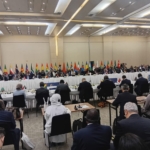
Civilisation, as defined by the modern European model, has long been associated with progress, the triumph of science over superstition, order over chaos, and individual comfort over communal inconvenience. Yet beneath its glittering architecture and promises of freedom lies a quiet epidemic: loneliness. The very structure of modern development that provides comfort, privacy, and independence has also isolated the human spirit.
In much of Europe and North America, adulthood begins abruptly at 18. Children are expected to leave home, find their own accommodation, and begin a journey of independence. It is a cultural milestone celebrated as a mark of maturity and self-sufficiency. Yet this early detachment from family and community often strips young people of the emotional cushioning that comes from collective living. In the absence of extended family networks and close-knit neighbours, loneliness grows in the shadows of prosperity.
The abundance of housing, one of the proudest symbols of modern progress, has ironically made people strangers to one another. Every individual has their own space, every family its private walls, and in between lie emotional deserts. It is not uncommon for people to live and die alone in Western cities, with neighbours discovering their fate only when the scent of decay seeps through the walls. Civilization has perfected the art of comfort but forgotten the essence of connection.
The African experience, however, tells a different story. The compound house, noisy, crowded, and full of gossip, is also a fortress of togetherness. Privacy may be scarce, but loneliness is even rarer. The same neighbour who irritates you with unsolicited chatter might also be the one to save your life or notice your absence. Curiosity, gossip, and communal scrutiny, often dismissed as backward or intrusive, have functioned as social guardrails that discourage isolation, depression, and moral decay.
In Africa, development has not yet erased the social glue that binds communities together. Even when there is tension or disagreement, the ever-present eye of the community offers a subtle check on behaviour. The young are watched over, the old are never forgotten, and the idea of dying alone is almost unimaginable.
Ironically, what the West celebrates as progress has produced emotional emptiness, while what Africa calls underdevelopment continues to sustain warmth and belonging. Where Western civilization exalts individuality, African culture exalts interdependence. The Western model teaches people to own more, while the African model teaches people to belong more.
This contrast is now reflected in the moral and psychological landscape of societies. The rising tide of depression, drug use, and identity confusion in the West cannot be separated from the structural loneliness that modern civilization has created. A child who grows up without communal anchors, who must face the storms of adulthood alone at 18, is often emotionally unprepared for the weight of existence.
Africa may not have all the answers, but perhaps true development should not mean erasing the human closeness that defines our way of life. The goal should not be to imitate the European model but to evolve our own, one that builds infrastructure, housing, and prosperity without destroying empathy, care, and neighbourly watchfulness.
It is telling that many from the so-called developed world who have discovered the communal spirit of Africa are now moving to the continent, drawn not by material abundance but by the richness of human connection. It is a quiet migration of souls seeking meaning. African governments should recognize this and begin, subtly and confidently, to promote the benefits of what others might call underdevelopment, the slower, more human pace of life that nurtures both the heart and the community.
For in the end, civilization is not about how well we live, but how well we live together. The West may have mastered systems and comfort, but Africa still holds the fragile, priceless secret of human warmth, the kind that keeps us truly alive.